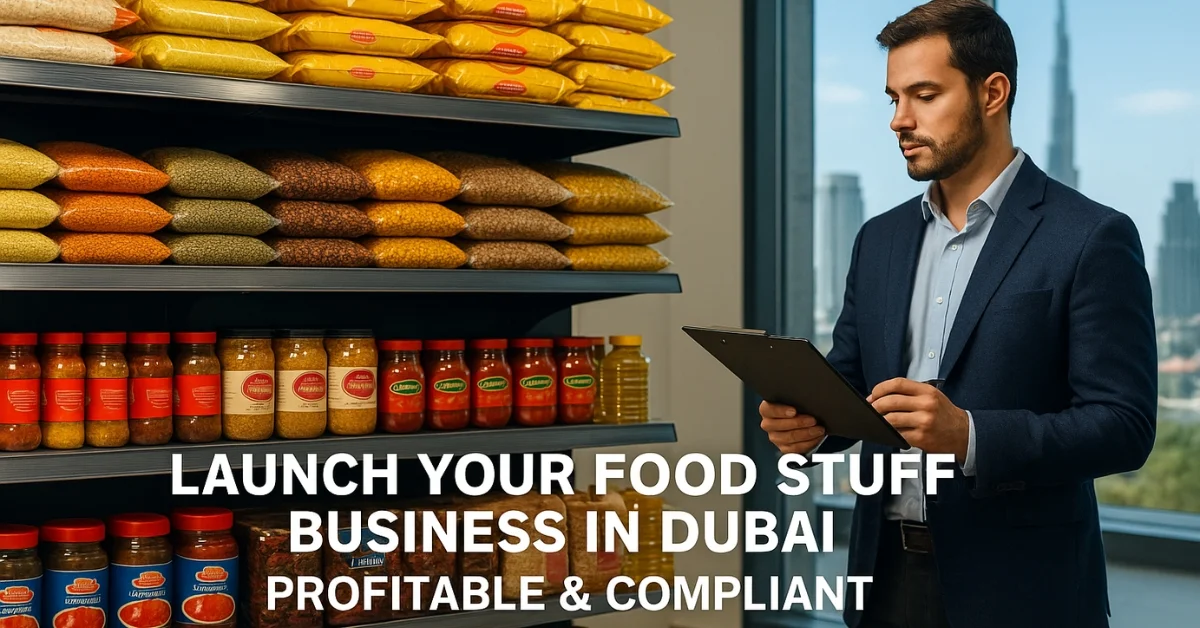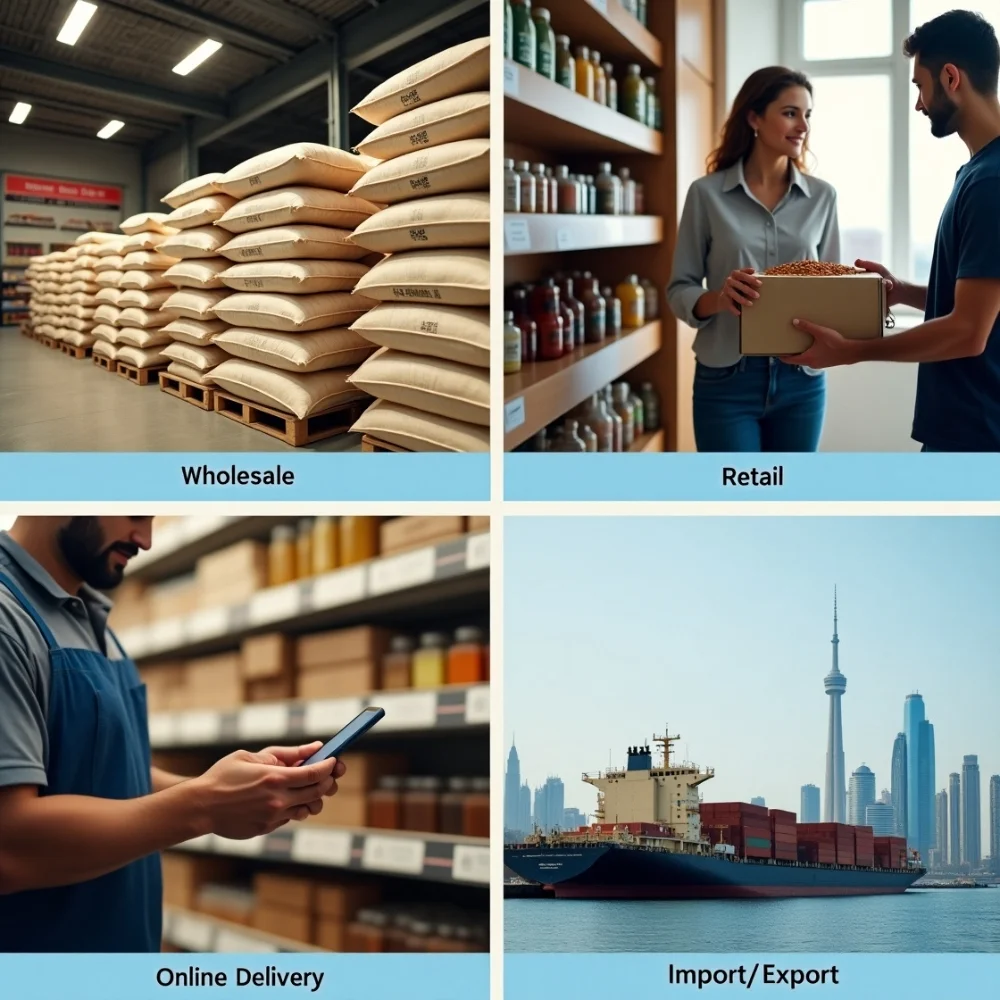
Dubai is one of the top destinations in the world for entrepreneurs looking to start a Food Stuff business. With its growing population, strong logistics network, and support for trade, it offers the perfect platform to build a profitable venture. Whether you’re interested in importing, distributing, or selling packaged foods, this guide will walk you through every important step you need to take to launch your Food Stuff business successfully.
Dubai’s Booming Food Sector Creates Big Opportunities
Dubai’s economy continues to grow, and so does its food demand. The city is a global hub where people from many cultures live and work, and this increases the demand for different types of Food Stuff, including packaged goods and imported products. Located at the crossroads of Asia, Africa, and Europe, Dubai serves as a key gateway for international trade, particularly in import and export. This means entrepreneurs can easily source Food Stuff from around the world and distribute it across the UAE or even re-export it. On top of that, the government strongly supports food trade and food security. The regulations are business-friendly, and many services are streamlined to help you succeed.
Advantages of Launching a Food Stuff Business in Dubai
These benefits make it easier and more rewarding to enter the food industry, especially when you plan properly and follow the legal requirements. Starting a Food Stuff business in Dubai comes with several advantages:
- Several UAE Free Zones offer 100% foreign ownership, eliminating the requirement for a local sponsor or partner.
- You get access to international suppliers and a diverse local market.
- Dubai offers zero personal and corporate income tax.
- Import and export logistics are simple and efficient.
- The profit margins in both retail and wholesale food trade are attractive.
Decide Your Business Model and Activity
Before officially starting your food stuff business in the UAE, it’s essential to plan out the kind of business you want to run. This decision will shape everything from your business license to your operations and marketing.

1. Choose the Right Type of Food Business
Several business models to choose from, depending on how much you want to invest and what your goals are. Here are the most common types of foodstuff businesses:
2. Wholesale Trading
This model involves buying food items in large quantities and selling them in bulk to supermarkets, restaurants, or other retailers. It’s ideal if you want to deal with high-volume sales and have storage space.
3. Retail Food Store
This setup includes grocery shops or food marts that sell directly to customers. These are physical stores located in high-traffic areas like residential neighborhoods or commercial zones.
Online Grocery or Delivery Service
With more people ordering food online, this model is growing fast. You can set up an e-commerce website or mobile app and deliver groceries to customers’ homes.
4. Import and Export of Food Products
If you’re interested in international trade, you can import packaged, processed, or specialty foods into the UAE or export local products abroad. This requires proper customs clearance and storage facilities. All of these models fall under the broad category of Food Stuff Trading, but the specific business activity you choose will affect the license type, location, and required approvals.
5. Select a Mainland or Free Zone Setup
Another important decision is where you want to register your company. In the UAE, you can choose between two main business setup options:
1. Mainland Setup
- Allows your business to trade throughout the UAE, including direct sales to customers in Dubai.
- Ideal if you plan to open a retail shop, supermarket, or restaurant.
- Gives access to a wide market with fewer restrictions on trade.
2. Free Zone Setup
- Best for businesses focused on import/export, warehousing, and online sales.
- Offers benefits like 100% foreign ownership, quick setup, and business-friendly environments.
- However, you may need a local distributor to sell products directly in the UAE market.
Step-by-Step Process to Register Your Food Stuff Company
Setting up a Food Stuff business in the UAE is a rewarding opportunity, especially in a country with a growing population, strong demand for food imports, and a robust trading environment. While the registration process includes several steps, it becomes easy if you follow them in order and stay prepared.
1. Finalize Your Business Name
The first official step is to decide on your company’s name. This is not just about branding it also needs to follow legal guidelines set by UAE authorities. Here’s what to consider:
- Follow UAE naming rules: Avoid any words that are offensive, disrespectful, or related to religion or politics.
- Avoid abbreviations: If you are using your name, use it in full. For example, use “Ali Hussain Trading” instead of “A.H. Trading.”
- Ensure uniqueness: Your business name must be different from other registered companies. You can check availability with the Department of Economic Development (DED) or the relevant Free Zone authority.
2. Select the Legal Structure
Next, you must choose the right legal structure for your business. This defines how your company is owned, managed, and taxed. Here are the most common options for a food business:
1. Sole Proprietorship
- Owned and operated by one person.
- Simple setup, but the owner is fully responsible for all business liabilities.
- Limited to specific types of businesses and may require the owner to be a UAE national for certain activities.
2. Limited Liability Company (LLC)
- The most popular structure for foodstuff trading in the UAE.
- Can have between 1 and 50 shareholders.
- Each owner’s liability is limited to their share in the company.
- Suitable for wholesale, retail, import export, and more.
- Offers flexibility and a strong presence in the UAE market.
3. Branch of a Foreign Company
- Allows an existing company outside the UAE to open a branch locally.
- The branch is required to perform the same business functions as its parent company.
- It is legally considered an extension of the parent company, which remains fully accountable for its actions and obligations.
3. Apply for Initial Approval
Once you’ve selected a business name and chosen your legal structure, the next step is to apply for initial approval.
This is essentially a No Objection Certificate (NOC) issued by the Department of Economic Development (DED) or the Free Zone Authority, depending on where you’re setting up.
- It confirms that the government has no objections to you starting your business.
- You need this approval before moving ahead with other steps like renting a place or applying for licenses.
4. Choose a Business Location
Make sure the property complies with Dubai Municipality standards, especially for cleanliness, ventilation, food storage, and hygiene, all critical for businesses dealing with food items. To operate legally in Dubai, your company must have a physical address. This could be:
- A retail shop where you sell directly to consumers
- A warehouse for storing imported goods
- An office space for managing your operations
5. Draft and Sign the Memorandum of Association (MOA)
If you’re setting up a Limited Liability Company (LLC), you must prepare a Memorandum of Association (MOA).
- This legal document outlines:
- Each partner’s ownership percentage
- The roles and responsibilities of shareholders
- Profit-sharing structure
6. Get Your Trade License
- With all documents in place, you can now apply for a Food Stuff Trading License.
- If you’re setting up on the Mainland, this license is issued by the DED.
- If you’re setting up in a Free Zone, the license comes from the Free Zone Authority.
Once you have this license:
- You can legally run your food business in Dubai
- Open a corporate bank account
- Start importing, selling, or distributing food products
Understanding the Food Stuff Trading License in Dubai
Getting the right license is essential it ensures your business can operate smoothly, meet legal requirements, and build trust with partners.
1. What the License Allows You to Do?
This license offers flexibility across the entire food supply chain, from sourcing to retail. With a valid Food Stuff trading license, you can:
- Import food items from international markets
- Sell food products in Dubai through a physical store or an online platform
- Distribute packaged or processed foods to shops, supermarkets, or restaurants
2. Authorities Involved in Licensing
If you’re dealing with perishable, frozen, or sensitive goods, you may need additional permits or inspections. Several government departments play a role in approving your Food Stuff business:
- DED manages the process of business registration and license issuance for companies established in the UAE mainland.
- Dubai Municipality’s Food Control Department oversees and verifies that your business meets the required standards for hygiene, health, and food safety.
- Free Zone Authority if you are setting up in a Free Zone, they manage your entire licensing and infrastructure process.
3. License Validity and Renewal
Keep all your records up to date to avoid delays or penalties during the renewal process. The Food Stuff trading license remains active for one year. To renew it, you’ll need:
- A valid tenancy contract (Ejari)
- Updated permits and inspection certificates
- Payment of the renewal fee
Documents Required to Start a Foodstuff Business
Starting a food trading business requires submitting both general business documents and food-specific certifications.
1. Basic Documentation
- Passport copies of all business partners or shareholders
- Emirates ID (if you’re a UAE resident)
- Approved business name reservation certificate
- Initial approval (NOC) from DED or Free Zone
- Valid tenancy contract for office, shop, or warehouse
- Signed and notarized Memorandum of Association (MOA)
2. Food-Specific Approvals
These documents prove that your business is committed to following Dubai’s strict food safety regulations protecting both your reputation and your customers. These documents confirm that your business meets all required hygiene and food safety regulations.
- Dubai Municipality approval from the Food Control Department
- Inspection report of your shop, warehouse, or office space
- Health and safety compliance certificate for your premises
Start Your Food Stuff Business with Lukadah
Lukadah Consultancy is your reliable partner for setting up a foodstuff business in Dubai. From selecting the right setup for the Mainland or Free Zone to handling trade licenses, Dubai Municipality approvals, investor visas, and location setup, Lukadah offers end-to-end support. With expert guidance, fast processing, and clear pricing, they make your business launch smooth and fully compliant. Focus on growing your Food Stuff trade while Lukadah handles the rest. Visit lukadah.com for details.
📞: +971 5 43 43 1112 | 📧: info@lukadah.com | ☎️: +971 4 39 40 800
Conclusion
Starting a Food Stuff business in Dubai is a smart move, but you must follow the right steps. Ensure your business follows all food-related laws, with special attention to health and safety standards. It’s also wise to consult a business setup expert to avoid delays and mistakes. Begin with a small setup and expand gradually. As demand grows, you can add more products, open new outlets, or even export to other regions. With the right planning and legal support, your Food Stuff business can thrive in Dubai’s fast-paced economy.
